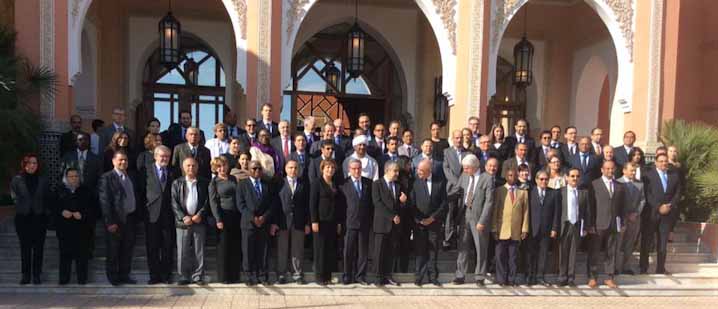Regional workshop on torture concludes in Marrakesh, for the prevention of mistreatment in MENA

16.12.2015. A high-level regional workshop to share experiences and best practices in preventing torture in police custody in the Middle East and North Africa (MENA) concluded yesterday with a call to the countries of the region to be more consistent with the Convention against Torture (CAT) and to ensure the full implementation of the laws that should protect against mistreatment in places of detention.
Speaking at the opening session of the workshop, on Monday 14th 2015, CNDH Chairman Driss El Yazami said that the effective elimination of torture is “essential for the establishment of the rule of law”.
The ratification of the Optional Protocol to the Convention against Torture and other Cruel, Inhuman or Degrading Treatment or Punishment (OPCAT) and the establishment of the National Preventive Mechanism, Mr. El Yazami said, “will accelerate the implementation of [the MENA countries’] commitments to prevent torture and build trust in the justice system in the region”.
Carsten Staur, Denmark’s Ambassador at the Permanent Mission of Denmark to the UN in Geneva, disregarded the ticking bomb scenario, that can be used as an argument to justify torture, as only “theoretical”. The use of torture, he said, actually “provides worst results than other types of interrogation techniques”.
Moroccan Minister Delegate of Foreign Affairs Mbarka Bouaida said “nothing can justify torture” and called for a universal ratification of the torture convention and its optional protocol.
The regional gathering was held by Wilton Park, in partnership with Convention against Torture Initiative and in association with Bristol University’s Human Rights Implementation Centre and the National Human Rights Council (CNDH), on 13-15 December 2015. It provided a neutral space for discussion about the key CAT implementation challenges, with a focus on the elimination of torture in police detention.
Mr. Juan Mendez, UN Special Rapporteur on torture and other cruel, inhuman or degrading treatment or punishment, and other international experts took part in this regional workshop.
The participants shared experiences, best practices and lessons learned in the implementation of torture-prevention policies and programs and explored options for viable solutions to prevent torture in police custody.
Almost all countries in MENA have ratified the CAT, but just two countries in the region (Morocco and Tunisia) have so far ratified the optional protocol to the convention.
Morocco ratified the OPCAT in 2014 and is now required to establish a national preventive mechanism against torture (NPM) one year after its ratification, at the latest.
The National Human Rights Council published a study on the international experiences and the different possible scenarios for the mechanism in Morocco. In association with several international partners, including the Association for the Prevention of Torture (APT), the CNDH held a series of seminars and workshops on the establishment of this mechanism.
NPMs are domestic bodies set up or designated under the OPCAT. They should be independent and given sufficient resources to carry out their work effectively.
NMPs must also have the power to access all places of detention, without restriction, to access all information on the number of persons in places of detention and to all information referring to the treatment of those persons and their detention conditions. They can be efficient and can significantly help reduce torture.






















